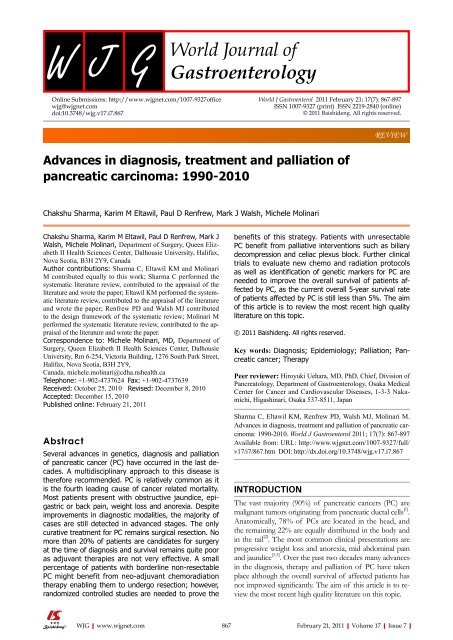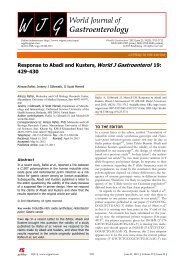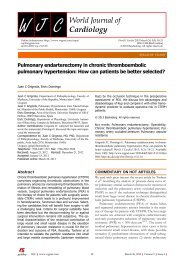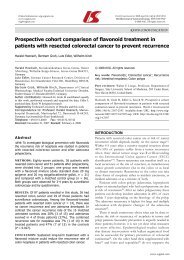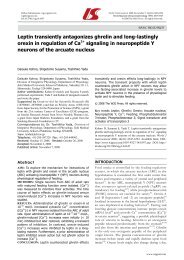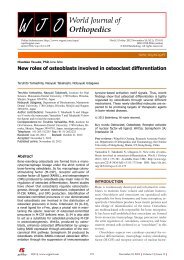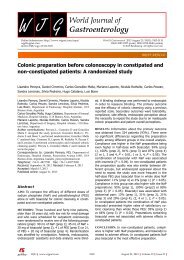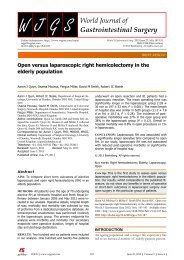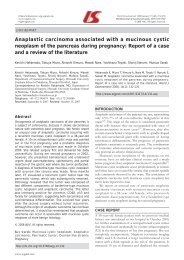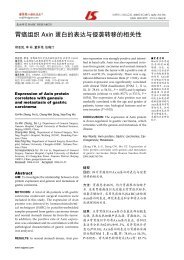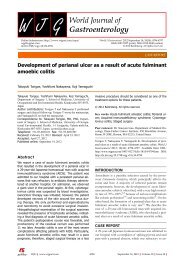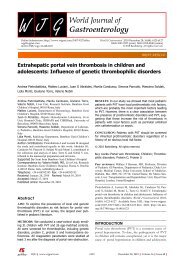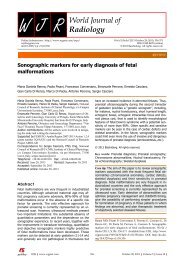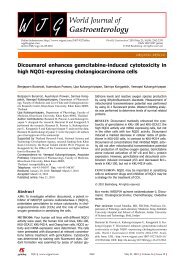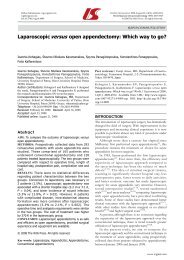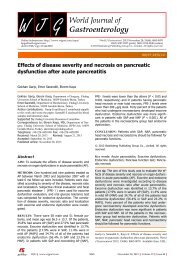Management of stage Ⅳ rectal cancer - World Journal of ...
Management of stage Ⅳ rectal cancer - World Journal of ...
Management of stage Ⅳ rectal cancer - World Journal of ...
Create successful ePaper yourself
Turn your PDF publications into a flip-book with our unique Google optimized e-Paper software.
Online Submissions: http://www.wjgnet.com/1007-9327<strong>of</strong>fice<br />
wjg@wjgnet.com<br />
doi:10.3748/wjg.v17.i7.867<br />
Advances in diagnosis, treatment and palliation <strong>of</strong><br />
pancreatic carcinoma: 1990-2010<br />
Chakshu Sharma, Karim M Eltawil, Paul D Renfrew, Mark J Walsh, Michele Molinari<br />
Chakshu Sharma, Karim M Eltawil, Paul D Renfrew, Mark J<br />
Walsh, Michele Molinari, Department <strong>of</strong> Surgery, Queen Elizabeth<br />
ІІ Health Sciences Center, Dalhousie University, Halifax,<br />
Nova Scotia, B3H 2Y9, Canada<br />
Author contributions: Sharma C, Eltawil KM and Molinari<br />
M contributed equally to this work; Sharma C performed the<br />
systematic literature review, contributed to the appraisal <strong>of</strong> the<br />
literature and wrote the paper; Eltawil KM performed the systematic<br />
literature review, contributed to the appraisal <strong>of</strong> the literature<br />
and wrote the paper; Renfrew PD and Walsh MJ contributed<br />
to the design framework <strong>of</strong> the systematic review; Molinari M<br />
performed the systematic literature review, contributed to the appraisal<br />
<strong>of</strong> the literature and wrote the paper.<br />
Correspondence to: Michele Molinari, MD, Department <strong>of</strong><br />
Surgery, Queen Elizabeth ІІ Health Sciences Center, Dalhousie<br />
University, Rm 6-254, Victoria Building, 1276 South Park Street,<br />
Halifax, Nova Scotia, B3H 2Y9,<br />
Canada. michele.molinari@cdha.nshealth.ca<br />
Telephone: +1-902-4737624 Fax: +1-902-4737639<br />
Received: October 25, 2010 Revised: December 8, 2010<br />
Accepted: December 15, 2010<br />
Published online: February 21, 2011<br />
Abstract<br />
Several advances in genetics, diagnosis and palliation<br />
<strong>of</strong> pancreatic <strong>cancer</strong> (PC) have occurred in the last decades.<br />
A multidisciplinary approach to this disease is<br />
therefore recommended. PC is relatively common as it<br />
is the fourth leading cause <strong>of</strong> <strong>cancer</strong> related mortality.<br />
Most patients present with obstructive jaundice, epigastric<br />
or back pain, weight loss and anorexia. Despite<br />
improvements in diagnostic modalities, the majority <strong>of</strong><br />
cases are still detected in advanced <strong>stage</strong>s. The only<br />
curative treatment for PC remains surgical resection. No<br />
more than 20% <strong>of</strong> patients are candidates for surgery<br />
at the time <strong>of</strong> diagnosis and survival remains quite poor<br />
as adjuvant therapies are not very effective. A small<br />
percentage <strong>of</strong> patients with borderline non-resectable<br />
PC might benefit from neo-adjuvant chemoradiation<br />
therapy enabling them to undergo resection; however,<br />
randomized controlled studies are needed to prove the<br />
WJG|www.wjgnet.com<br />
<strong>World</strong> J Gastroenterol 2011 February 21; 17(7): 867-897<br />
ISSN 1007-9327 (print) ISSN 2219-2840 (online)<br />
© 2011 Baishideng. All rights reserved.<br />
benefits <strong>of</strong> this strategy. Patients with unresectable<br />
PC benefit from palliative interventions such as biliary<br />
decompression and celiac plexus block. Further clinical<br />
trials to evaluate new chemo and radiation protocols<br />
as well as identification <strong>of</strong> genetic markers for PC are<br />
needed to improve the overall survival <strong>of</strong> patients affected<br />
by PC, as the current overall 5-year survival rate<br />
<strong>of</strong> patients affected by PC is still less than 5%. The aim<br />
<strong>of</strong> this article is to review the most recent high quality<br />
literature on this topic.<br />
© 2011 Baishideng. All rights reserved.<br />
Key words: Diagnosis; Epidemiology; Palliation; Pancreatic<br />
<strong>cancer</strong>; Therapy<br />
Peer reviewer: Hiroyuki Uehara, MD, PhD, Chief, Division <strong>of</strong><br />
Pancreatology, Department <strong>of</strong> Gastroenterology, Osaka Medical<br />
Center for Cancer and Cardiovascular Diseases, 1-3-3 Nakamichi,<br />
Higashinari, Osaka 537-8511, Japan<br />
Sharma C, Eltawil KM, Renfrew PD, Walsh MJ, Molinari M.<br />
Advances in diagnosis, treatment and palliation <strong>of</strong> pancreatic carcinoma:<br />
1990-2010. <strong>World</strong> J Gastroenterol 2011; 17(7): 867-897<br />
Available from: URL: http://www.wjgnet.com/1007-9327/full/<br />
v17/i7/867.htm DOI: http://dx.doi.org/10.3748/wjg.v17.i7.867<br />
INTRODUCTION<br />
REVIEW<br />
The vast majority (90%) <strong>of</strong> pancreatic <strong>cancer</strong>s (PC) are<br />
malignant tumors originating from pancreatic ductal cells [1] .<br />
Anatomically, 78% <strong>of</strong> PCs are located in the head, and<br />
the remaining 22% are equally distributed in the body and<br />
in the tail [2] . The most common clinical presentations are<br />
progressive weight loss and anorexia, mid abdominal pain<br />
and jaundice [3-5] . Over the past two decades many advances<br />
in the diagnosis, therapy and palliation <strong>of</strong> PC have taken<br />
place although the overall survival <strong>of</strong> affected patients has<br />
not improved significantly. The aim <strong>of</strong> this article is to review<br />
the most recent high quality literature on this topic.<br />
867 February 21, 2011|Volume 17|Issue 7|


